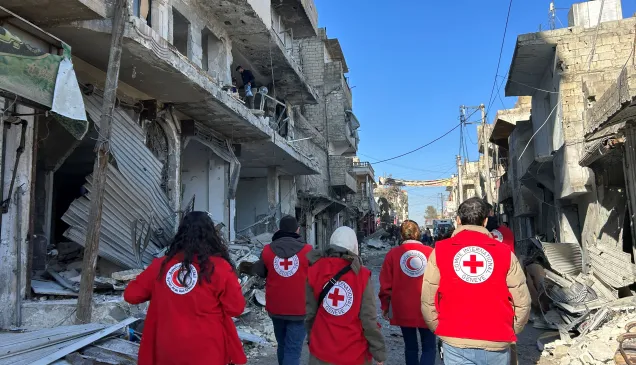Syria: Desperate population needs regular unimpeded aid, whatever talks outcome
Geneva/Damascus (ICRC) - The parties battling each other in Syria's nearly 5-year-old conflict must allow a regular flow of aid to reach all those civilians suffering amid the fighting, whatever the outcome of peace talks getting under way in Geneva, the International Committee of the Red Cross (ICRC) has said.
"I saw malnourished young children and frail old people in an appalling state in Madaya, when we were able to get there earlier this month. But we were only able to deliver a few truckloads of aid, which took months to negotiate. This was too little, and too late for some, "said the head of the ICRC in Damascus, Marianne Gasser.
There are dozens of other towns such as Douma, Moadamiyah, Foua, Kefraya and DeirEzour, which humanitarian groups still cannot get into, Ms. Gasser said.
The start of a new round of Syrian peace talks, bringing the warring parties together in Geneva "is a positive signal. But we have been pushing and pleading for regular access to these and other towns to address the tremendous suffering – thus far to no avail."
The warring parties must also stop attacks on the country's battered infrastructure, in particular on healthcare facilities and water installations, which often come under renewed attack as soon as they have been patched up by the ICRC and other humanitarian groups, Ms. Gasser said.
More than 4.5 million people with immense humanitarian needs are living in areas extremely hard to access because of fighting, with over half a million living in places besieged by different warring parties and no political solution in sight for lifting the sieges, said Ms. Gasser. "In all these places, no aid can get in, putting millions of lives at risk."
"Those who hold Syria's present and future in their hands must pause for a moment and think of the appalling suffering that prevails all over the country and think of how they can help us restore a little hope; people's lives must come before politics," Ms. Gasser said.
For further information, please contact:
Dibeh Fakhr, ICRC Geneva, tel: +41 79 447 37 26 Twitter: @DFakhrICRC



